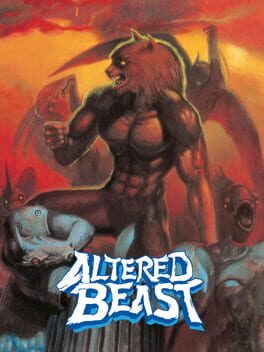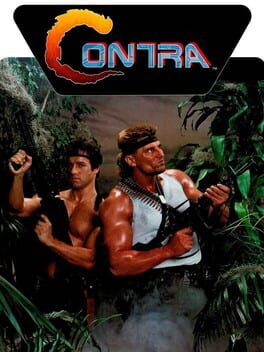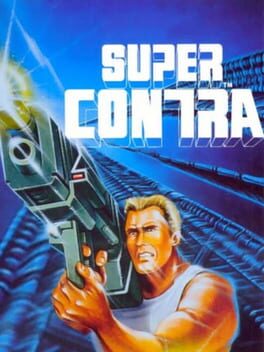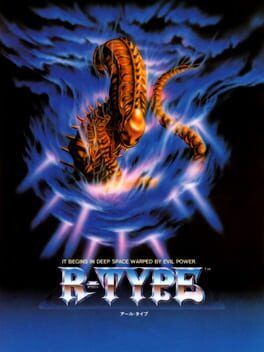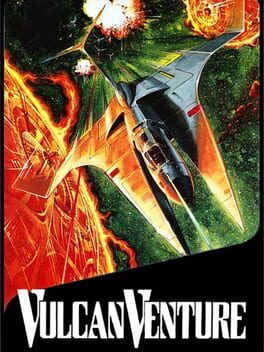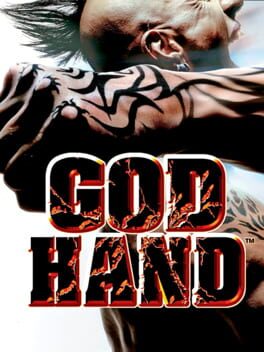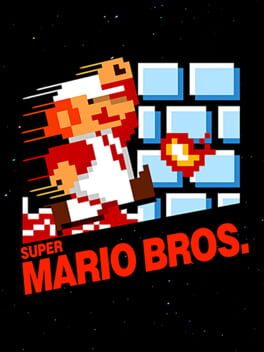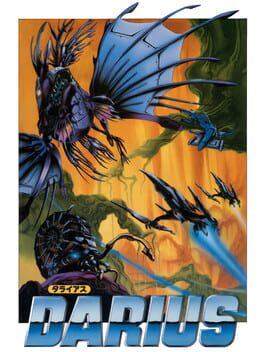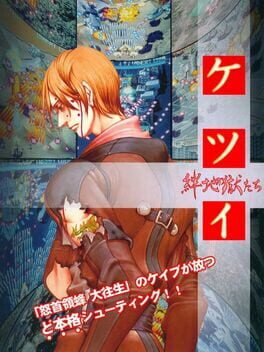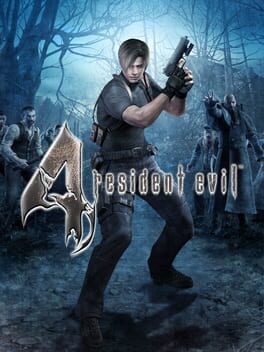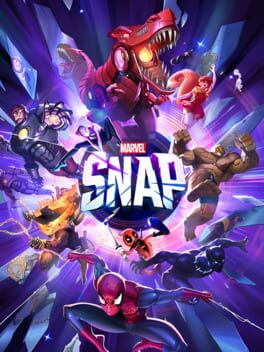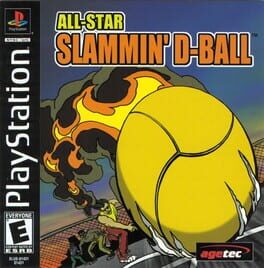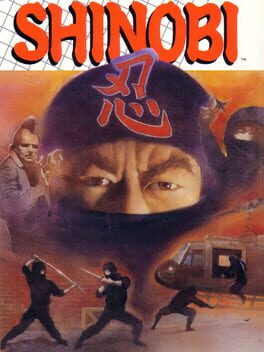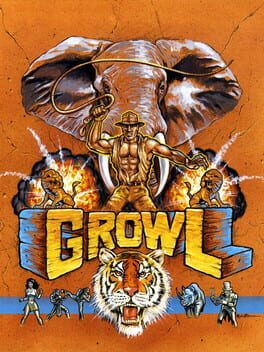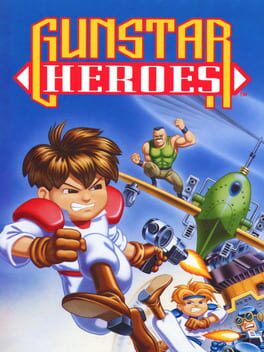ogremode
1988
1987
1988
1987
Irem's debut shooter, R-Type, is a really special game. It has incredible art direction, really going for the overtly sexual aspects of the Giger look that most games are too cowardly to use; one of the bosses you'll be fighting is a bunch of worm penises emerging from vaginas.
It also has the "Force," an invincible option, that connects to your ship in front of or behind you; it acts as a shield, absorbing enemy fire. You can fire the Force so it floats horizontally and fires; often bosses will have a hard to reach weak area that you can fling your Force into to continue doing damage even while it's locked off from your main ship. It's a really fun addition.
However I had an insanely hard time getting through it. The game is beyond arcade difficult. I played through it with infinite credits and I'm glad I got to see it all, even though dying constantly stopped me from playing with too many of the upgrades, but it can not be overstated how difficult it is.
It also has the "Force," an invincible option, that connects to your ship in front of or behind you; it acts as a shield, absorbing enemy fire. You can fire the Force so it floats horizontally and fires; often bosses will have a hard to reach weak area that you can fling your Force into to continue doing damage even while it's locked off from your main ship. It's a really fun addition.
However I had an insanely hard time getting through it. The game is beyond arcade difficult. I played through it with infinite credits and I'm glad I got to see it all, even though dying constantly stopped me from playing with too many of the upgrades, but it can not be overstated how difficult it is.
1988
Gradius II/Vulcan Venture is an incremental upgrade to Gradius and Salamander/Life Force. The team took some of the ideas from Salamander for this game, like the fire dragon enemies.
I played through the Japanese arcade version on Konami Arcade Classics Anniversary Collection which was pretty managable until the last few levels. The last level is a true gauntlet. Besides flying through a cramped spaceship (that honestly reminded me a lot of the final level of Scramble), there's a section where you have to dive between the legs of a giant walking insect robot as it steps forward, then back, across the screen, and it was incredibly difficult. After you make it through all this, the game ends with a nastily rendered reward not-boss that looked really cool.
Gradius II notably has a pretty good boss rush level, but it also disappointingly drops the vertical sections, and I liked that variety and the sleek transitions from the prior two games.
I played through the Japanese arcade version on Konami Arcade Classics Anniversary Collection which was pretty managable until the last few levels. The last level is a true gauntlet. Besides flying through a cramped spaceship (that honestly reminded me a lot of the final level of Scramble), there's a section where you have to dive between the legs of a giant walking insect robot as it steps forward, then back, across the screen, and it was incredibly difficult. After you make it through all this, the game ends with a nastily rendered reward not-boss that looked really cool.
Gradius II notably has a pretty good boss rush level, but it also disappointingly drops the vertical sections, and I liked that variety and the sleek transitions from the prior two games.
2006
I'm not sick of God Hand yet so for my third play through I decided to do a Kick Me Sign run—a challenge run in which you can never activate your tension meter, and you can never use your special roulette abilities. It's called a "kick me sign" run because in one of the early stages you get a kick me sign slapped on your back, and it drops off when you use those special abilities—I was surprised to learn that the sign is persistent throughout levels if you don't use your abilities. In fact you are rewarded with unlockable music tracks after completing it, though the game never explicitly mentions this run as far as I know, which is an interesting bit of design in itself. You're never technically locked away from using the special attacks either, so there's a level of self control to it. You can even activate the roulette ability to slow down time and make your character face an enemy, and then back out of the menu without selecting a special ability. I learned the hard way to be extra careful about this—if you accidentally hit the special attack and then let yourself get killed so you can start the level over, you'll actually have to go back to whatever your latest save was to get the sign back on your back.
My experience for the KMS run was surprisingly close to my prior play throughs. It's simple enough to live without "Unleashed Mode," which turns Gene invincible and lets you wail away at an enemy while your Tension Meter ticks down; in lieu of that, you're just forced to put more time and damage into enemies, and to be more careful and consistent about dodging. In other words, you're forced to play better. I felt the most pain without that ability fighting the enemies that were really good at dodging you—Tiger Joe, Devil Hand—since the Unleashed Mode gives you a bit of a breather and a level of essentially guaranteed damage. I also missed this mode when fighting the demons, since they tend to run away from you and it can be very annoying to chase them down.
The inability to use roulette moves are a different story, and really highlighted the gaps in Gene's toolbox. For one thing, there's no gap closing technique, no projectile, no easy crowd control move—without these in your back pocket, it can make certain encounters pretty annoying and hard to deal with at the higher difficulty levels. I eventually learned to rely on juggling enemies and separating them to keep things under control. I still don't have a great solution to when the game sends a whip wielder plus a couple of "leader" characters at you (the tall enemies that have some kind of gimmick—axe wielders, knife throwers, etc.). The whip wielder tends to hide behind these leader types, so your best bet is to do some hit and run attacks, but since they're cloistered together it's just as likely Gene will tackle the wrong enemy, and that's a tedious, fraught way to play already. I wish there was a larger variety of crowd control techniques too—there's the round house kick and the quicker, weaker round kick move, but your best move is to juggle enemies and launch them, which takes a lot of patience and skill to pull off when you're being attacked by multiple enemies.
I had a lot of fun with this challenge run but would be lying if I didn't say I found myself frustrated with certain limitations, but this is the first time, after two complete playthroughs, that I have felt that way about God Hand. I wouldn't recommend this challenge run necessarily unless you're like me and are trying to squeeze as much juice out of the game as possible. The in-game reward doesn't feel worth it, and the game feels designed to be played with the special abilities. But I might not completely feel that way once I finish the game on hard mode...
I'm still not sick of God Hand after finishing the run. After my third playthrough, I just wish I was better at God Hand. This time I managed to stay between second and third difficulty for most of the game, with dips into the fourth difficulty mode, but I felt really challenged in third difficulty already...
My experience for the KMS run was surprisingly close to my prior play throughs. It's simple enough to live without "Unleashed Mode," which turns Gene invincible and lets you wail away at an enemy while your Tension Meter ticks down; in lieu of that, you're just forced to put more time and damage into enemies, and to be more careful and consistent about dodging. In other words, you're forced to play better. I felt the most pain without that ability fighting the enemies that were really good at dodging you—Tiger Joe, Devil Hand—since the Unleashed Mode gives you a bit of a breather and a level of essentially guaranteed damage. I also missed this mode when fighting the demons, since they tend to run away from you and it can be very annoying to chase them down.
The inability to use roulette moves are a different story, and really highlighted the gaps in Gene's toolbox. For one thing, there's no gap closing technique, no projectile, no easy crowd control move—without these in your back pocket, it can make certain encounters pretty annoying and hard to deal with at the higher difficulty levels. I eventually learned to rely on juggling enemies and separating them to keep things under control. I still don't have a great solution to when the game sends a whip wielder plus a couple of "leader" characters at you (the tall enemies that have some kind of gimmick—axe wielders, knife throwers, etc.). The whip wielder tends to hide behind these leader types, so your best bet is to do some hit and run attacks, but since they're cloistered together it's just as likely Gene will tackle the wrong enemy, and that's a tedious, fraught way to play already. I wish there was a larger variety of crowd control techniques too—there's the round house kick and the quicker, weaker round kick move, but your best move is to juggle enemies and launch them, which takes a lot of patience and skill to pull off when you're being attacked by multiple enemies.
I had a lot of fun with this challenge run but would be lying if I didn't say I found myself frustrated with certain limitations, but this is the first time, after two complete playthroughs, that I have felt that way about God Hand. I wouldn't recommend this challenge run necessarily unless you're like me and are trying to squeeze as much juice out of the game as possible. The in-game reward doesn't feel worth it, and the game feels designed to be played with the special abilities. But I might not completely feel that way once I finish the game on hard mode...
I'm still not sick of God Hand after finishing the run. After my third playthrough, I just wish I was better at God Hand. This time I managed to stay between second and third difficulty for most of the game, with dips into the fourth difficulty mode, but I felt really challenged in third difficulty already...
1985
1987
The biggest impression Darius makes is it's presentation—super wide, projected from three CRTs side by side in the original cabinet. The levels look good, even though it's repetitive, the enemies and your ship look cool—but the boss enemies are the coolest, massive robotic fish that I have to imagine would take up most of a crt screen themselves.
The sense of choice and progression—both in your ship upgrades and in selecting each level—is decidedly utilitarian, but just enticing enough to make me want to replay, if only so I can see what bosses are behind door number two.
The sense of choice and progression—both in your ship upgrades and in selecting each level—is decidedly utilitarian, but just enticing enough to make me want to replay, if only so I can see what bosses are behind door number two.
2011
I've been really excited about the Resident Evil 4 Remake, and couldn't wait to dig into the demo tonight. It looks great, but I wish I liked it more. The encounters feel sparse, broken up with cinematic, tension building exploration sequences that nonetheless feel like filler. There's a few more cutscenes, some of which trigger based on your behavior, like the chainsaw enemy cutting up part of the level as he chases you, which is a cool addition and again looks sick, but snatching away control as you're trying to fight off the village feels terrible and weirdly antiquated. The changes to the combat don't seem to be in its favor either--RE4R is faster than the original game, but also weightier, more animation driven, and as a consequence it doesn't feel half as good as the original game, which is slow, but snappy. Maybe I'll feel differently playing the full remake, as I adjust to these changes, though I feel like I'd just have more fun replaying the old game. There's also a surprising emphasis on stealth, which is the opposite of what I want from this game. I also encountered a bug where Leon got stuck on a corner and got killed, which made the whole experience feel even worse.
I booted up Resident Evil 4 HD immediately after playing the demo, and played through the village for my second time tonight. It's plainly so much more fun, so much more gamey. Enemies fell to their knees and Leon sent them flying, knocking down a group of enemies like bowling pins. I don't know how you modernize such an arcade feeling, perfect action game to modern standards without losing what makes it excellent. And unfortunately, it looks like Capcom doesn't either.
I booted up Resident Evil 4 HD immediately after playing the demo, and played through the village for my second time tonight. It's plainly so much more fun, so much more gamey. Enemies fell to their knees and Leon sent them flying, knocking down a group of enemies like bowling pins. I don't know how you modernize such an arcade feeling, perfect action game to modern standards without losing what makes it excellent. And unfortunately, it looks like Capcom doesn't either.
2022
I played this game every day between October 1 and February 7. The gameplay of Snap is excellent, and for a while the treadmill is really enticing—I earned new cards at a pace and in an order that successfully sparked some inspiration in the new combos I could try. When that happened, I could play dozens of games whittling the new deck and strategy down, until I got something new that did the same thing, and so on. As deck variety increases so does strategic complexity, and the game is excellent at getting you time and opportunity to explore its systems; there's not many explicit tutorials, but the card effects are simple and the rate at which your decks grow feels so natural. It must be said the card game itself feels really well-designed and balanced, and for many characters right on theme. I had a great time for a long time.
However, as I reached collector level or whatever 2000, the pace of new cards, let alone new cards that inspired new decks of strategies to play with, had slowed almost to a halt. I had plenty of different deck archetypes that were strong and fun to play, but playing them over and over was wearing thin, and often due to this game's strange match making I found myself playing against the same kind of decks I was using over and over, and when I rarely played against a player with a significantly different deck they had some higher tier cards I didn't even have in my deck yet that were frustrating to play against. I probably maintained between a 50% and 60% win rate, if not lower than that, and since you lose cubes or whatever when you lose, I would get to a certain tier in the battle pass and just stick there, constantly floating around the 40s. I felt like I wasn't making any progress in any of the games many progress areas, and for a while just continued playing to complete the daily missions, with the idea that eventually I would open a card that made the game feel fun again. It finally felt like the game was trying to get me to spend money, for the sheer possibility that I might, just maybe, get something out of it. I did some of the battle passes over this period, but as late in the game as I was it no longer felt worth it, and I spent days trying to get myself to stop playing, since at this point it had become a habit to pop it open whenever I had a couple minutes.
Then the shitty Marvel movie tie-in battle pass showed up and reminded me I actually hate all this shit, so I haven't played since. Still, I don't regret my time with it. Marvel Snap was a really fun game until it wasn't.
However, as I reached collector level or whatever 2000, the pace of new cards, let alone new cards that inspired new decks of strategies to play with, had slowed almost to a halt. I had plenty of different deck archetypes that were strong and fun to play, but playing them over and over was wearing thin, and often due to this game's strange match making I found myself playing against the same kind of decks I was using over and over, and when I rarely played against a player with a significantly different deck they had some higher tier cards I didn't even have in my deck yet that were frustrating to play against. I probably maintained between a 50% and 60% win rate, if not lower than that, and since you lose cubes or whatever when you lose, I would get to a certain tier in the battle pass and just stick there, constantly floating around the 40s. I felt like I wasn't making any progress in any of the games many progress areas, and for a while just continued playing to complete the daily missions, with the idea that eventually I would open a card that made the game feel fun again. It finally felt like the game was trying to get me to spend money, for the sheer possibility that I might, just maybe, get something out of it. I did some of the battle passes over this period, but as late in the game as I was it no longer felt worth it, and I spent days trying to get myself to stop playing, since at this point it had become a habit to pop it open whenever I had a couple minutes.
Then the shitty Marvel movie tie-in battle pass showed up and reminded me I actually hate all this shit, so I haven't played since. Still, I don't regret my time with it. Marvel Snap was a really fun game until it wasn't.
An arcade style dodgeball game developed by a small developer named Access, for D3 Publisher's Simple series, brought over to the States by A1 Publishing, who also published underrated Shooter: Starfighter Sanvein in the US, and Agetec, who published dozens of well-known Japanese games in the States too many to list but including Armored Core and Raw Danger. I played this game a lot as a kid in multiplayer and always liked it. The sprites look good, and there's a hint of achievable technical mastery that is unfortunately let down by the execution—dodging and catching just feels really inconsistent, which is too bad, like it doesn't read your inputs correctly or something. Not the best of these budget games, but I have a lot of nostalgia for it.
1987
Played the Sega Ages version on the Switch. I enjoy Rolling Thunder-likes and had a good time blasting through this one. This is a ninja themed game where you also get a gun for some reason. The Sega Ages release also lets you map the melee attack to a different button, which makes it a lot more reliable than hoping the contextual action button works out in your favor.
The sprites look nice, and there's an okay variety of enemies—three or four different types and a few palette swaps. The bosses are cool, but I don't like the way the first boss feels—you have to hit the samurai's head Dracula style, but it's at a really awkward spot in your jump arc; melee makes it a little easier. I liked taking down the huge helicopter and the final ninja, who has a lot of tricks up his sleeve.
Altogether this is a pretty tolerable early arcade action game, and I'm looking forward to playing the sequels.
The sprites look nice, and there's an okay variety of enemies—three or four different types and a few palette swaps. The bosses are cool, but I don't like the way the first boss feels—you have to hit the samurai's head Dracula style, but it's at a really awkward spot in your jump arc; melee makes it a little easier. I liked taking down the huge helicopter and the final ninja, who has a lot of tricks up his sleeve.
Altogether this is a pretty tolerable early arcade action game, and I'm looking forward to playing the sequels.
1991
1993
